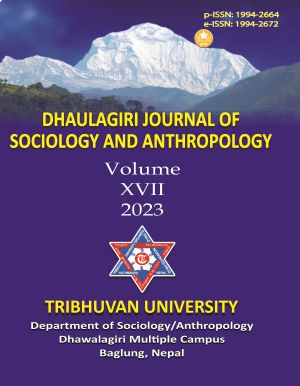Ecological Implications of Local Curriculum: Lessons Learned from a Participatory Action Research Project in a School in Nepal
DOI:
https://doi.org/10.3126/dsaj.v17i01.61139Keywords:
Keywords: Ecological implications, local curriculum, PAR, transformative sustainabilityAbstract
The dominant schooling design of the schools in Nepal celebrates Western-modern ideals of indoor schooling structure. The indoor design has continuously separated school education from the 'living' world. It has also constrained pedagogical innovations for outdoor teaching and learning. As textbook-based indoor teaching and learning has been culturally established as the standards of school education, despite several trainings and capacity development programs for headteachers and teachers, many schools in Nepal have not been able to address the intent of local curriculum for outdoor teaching and learning. Against this background, evidenced through the lessons learned from a Participatory Action Research (PAR) project for contextualized teaching and learning in a rural-located school in Nepal, this study portrays how the initiations for the local curriculum has been sandwiched in the limited space of linearly designed indoor pedagogical structure of the school. It argues the need to discover the ecological implications of the local curriculum. Following the transformative sustainability principles, the ecological implications suggest local curriculum practitioners revisit indoor schooling design and make it flexible to embrace community lifeworld as teaching and learning resources
Downloads
Downloads
Published
How to Cite
Issue
Section
License
Copyright (c) 2023 Shree Krishna Wagle

This work is licensed under a Creative Commons Attribution-NonCommercial-ShareAlike 4.0 International License.




